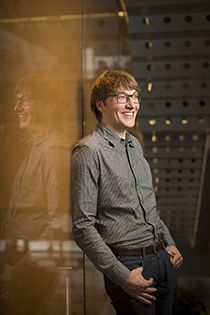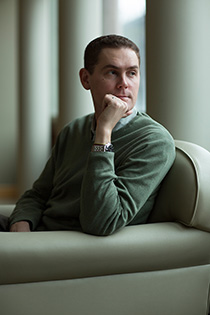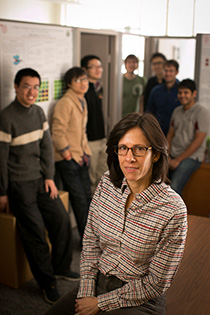Cover Story Sidebar
Campaign gifts strengthen the heart of the university -- the faculty

Malte Jung, assistant professor in information science. See larger image
Malte Jung, assistant professor in information science at Cornell and the Nancy H. '62 and Philip M. '62 Young Sesquicentennial Faculty Fellow, studies the intersection of technology and emotion, a pairing his students – and most people – don't yet understand.
He recently asked students in his Human-Robot Interaction course to build a tower out of spaghetti, tape, string and a marshmallow, and then asked them how a robot might help with the task.
"They all gave technical answers," he says. "No one thought about how a robot on the team might alleviate conflict or make sure everyone's ideas are heard."
While a large group of scholars worldwide study interactions between people and robots, Jung is alone in researching how robots affect human dynamics within groups. He aims to give his students an awareness of the impact of technology on teamwork.
Cornell Computing and Information Science (CIS), Jung says, provides just the right collaboration-driven place for him to be doing this singular research. "This range of technology and social dynamics is an incredibly perfect fit here at Cornell."
Jung is helping this new department grow quickly, keeping up with and leading peer information science programs. His hire, made possible by a gift from Philip and Nancy Young '62, came at a key moment, says Jon Kleinberg, the Tisch University Professor of Computer Science and chair of Cornell's Department of Information Science.

Andrew Davis, the Suk Cha MBA '84 Sesquicentennial Faculty Fellow, works in the developing field of behavioral operations management. He brought a major conference to Johnson in 2015 and, at age 34, was named one of Poets and Quants' Best 40 Under 40 Business School Professors 2015. See larger image
"It was important for us to hire some of the strongest junior people on the market," Kleinberg says. "It's helped us become one of the leaders in this area."
Gifts for faculty support shape the university's future while continuing academic excellence, says Provost Michael Kotlikoff.
"Support for faculty positions enhances the ability of departments to retain and support our outstanding faculty and also bring to Cornell new, distinguished scholars who will influence future generations of students," he says.
Campaign gifts totaling $655 million toward overall faculty support have positioned the heart of the university – its faculty – to lead the world in research and discovery and to bring these discoveries directly to Cornell students.
Throughout the course of the campaign, 90 endowed professorships were established, as well as 31 endowed nonprofessorship positions, including coaches, librarians and the new Dr. Peter J. Thaler '56 Cornell University Archivist position held by Evan Earle '02, M.S. '14. In addition to these endowed positions, donors supported 76 named Sesquicentennial Faculty Fellowships, including the one that brought Jung to CIS.

Roseanna Zia, assistant professor of chemical and biomolecular engineering. See larger image
Roseanna Zia, assistant professor of chemical and biomolecular engineering and a James C. and Rebecca Q. Morgan Sesquicentennial Faculty Fellow, says that the faculty fellowship brought her to this renowned department in 2013 ("I couldn't have picked a better place to get started in my career," she says) and also paved the way for additional awards to further her research and teaching – including a National Science Foundation CAREER award and an Office of Naval Research Young Investigator Award, both in 2014.
"These enabled me to grow my group to a size I would not have had until after tenure," she says. "More students means I can ask and answer all the questions I want to. They are the lifeblood of my research."
Zia and her research group, now comprising eight graduate students, four undergraduates and one postdoctoral researcher, explore the properties of complex fluids (which are found in foods, pharmaceuticals and the human body; blood is a complex fluid), not only to enable the design of smart materials and model microscopic environments such as the interior of cells, but also to look for answers to fundamental questions about the structure of matter.
"We have a strong tradition in the area of complex fluids," she says of the newly named Robert Frederick Smith School of Chemical and Biomolecular Engineering at Cornell. "We have a strong future, as well."